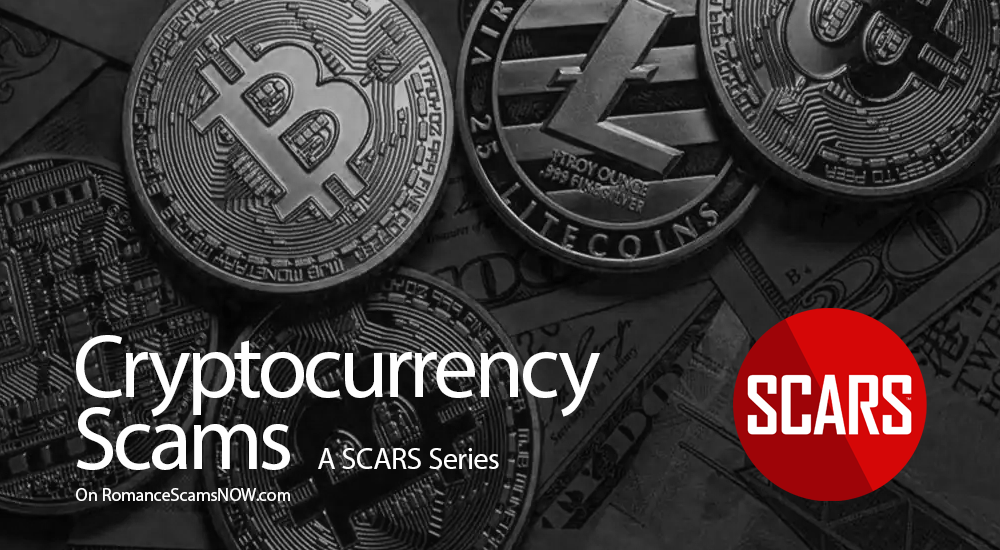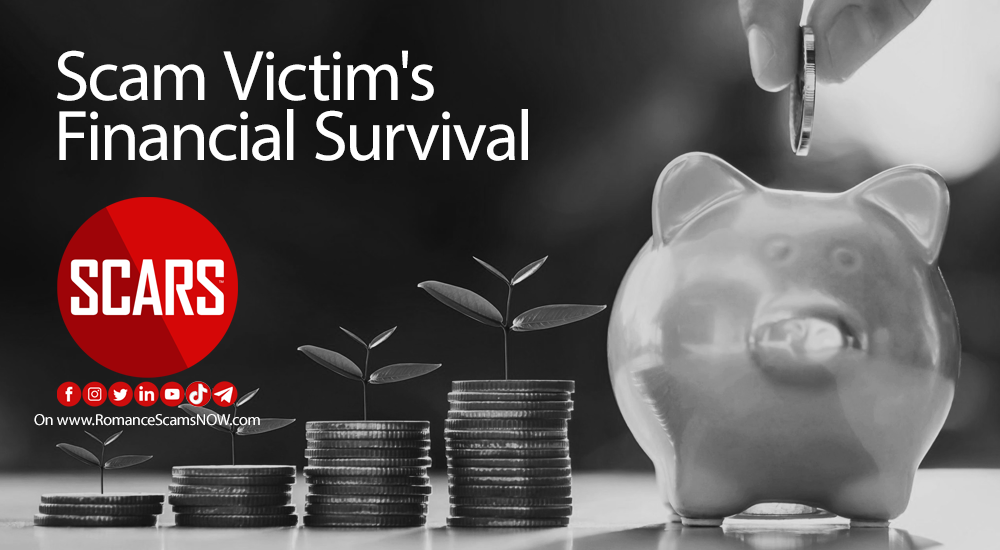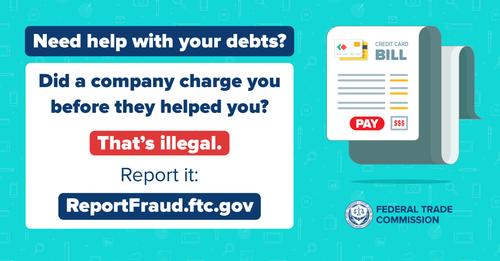
SCARS Institute’s Encyclopedia of Scams™ Published Continuously for 25 Years

Credit Card Debt Relief That Isn’t
Scam victims are often financially devastated after a relationship scam ends and often turn to debt relief companies. Many times they turn to debt relief services to help, only to find they are being scammed again.
What Is A Debt Relief Company?
A debt relief company is a business that helps people get out of debt by negotiating with creditors to lower the amount owed. Debt relief companies typically charge a fee for their services, which can be a percentage of the total debt or a monthly fee.
There are two main types of debt relief plans: debt settlement and debt consolidation.
1. Debt settlement is a process in which a debt relief company negotiates with your creditors to lower the amount you owe. This is done by convincing the creditors that you are unable to repay your debt in full and that they are better off accepting a lump sum payment in a settlement.
To enroll in a debt settlement program, you will need to stop making payments on your debts. This will damage your credit score, but it is necessary to convince creditors to accept a settlement. The debt relief company will then use the money you have been paying into the program to negotiate with your creditors.
The amount of time it takes to complete a debt settlement program varies, but it can take several months or even years. Once the program is complete, you will no longer owe the debt that was settled. However, you will still owe any interest that accrued on the debt during the time you were not making payments.
2. Debt consolidation is a process in which you take out a new loan to pay off your existing debts. This can help to lower your monthly payments and make it easier to manage your debt.
To enroll in a debt consolidation program, you will need to apply for a loan from a debt consolidation company. The amount of the loan will be based on your income and debt. Once you have been approved for the loan, you will use the money to pay off your existing debts.
Debt consolidation can be a helpful way to get out of debt, but it is important to compare interest rates and fees before you choose a company. You should also make sure that you can afford the monthly payments on the new loan.
If you are considering using a debt relief company, there are a few things you should keep in mind:
- Beware of scams. There are many unscrupulous debt relief companies that prey on people who are struggling with debt. Do your research and make sure the company you choose is reputable.
- Understand the fees. Debt relief companies typically charge fees for their services. These fees can be high, so make sure you understand what you are getting into before you sign up for a plan.
- Be prepared for a hit on your credit score. When you stop making payments on your debts, your credit score will take a hit. This is a necessary part of the debt settlement process, but it is something to be aware of.
- Make sure you are ready to commit. Debt relief can be a long and difficult process. Make sure you are committed to making the payments and following the plan before you sign up.
If you are struggling with debt, a debt relief company may be able to help. However, it is important to do your research and understand the risks before you sign up for a plan since they can just as easily be another scam.
According To The Federal Trade Commission:
Say you’re struggling to pay off your credits cards — which is already difficult with high-interest rates — and you hear about a company that promises to reduce or eliminate your credit card debt for a fee. Sounds great, right? But how can you tell if that offer is legitimate or a scam?
The FTC recently announced settlements with the operators of a deceptive debt relief scam. The FTC sued the three operators and their related companies (which went by multiple names including ACRO Services) for taking tens of millions of dollars from people by falsely promising to eliminate or reduce their credit card debt. The scam charged people fees in the thousands of dollars and even told them to stop making payments to their credit card companies — leaving people in a far worse position — with damaged credit and owing their original debts plus thousands in fees and interest.
As part of the settlements with the FTC, these scammers are permanently banned from running any debt relief services or engaging in telemarketing, and they must turn over assets that will be used to provide any possible refunds to people affected by the scam.
Follow these steps to spot and avoid credit card debt relief scams:
- Don’t pay upfront. It’s illegal for a debt relief company to charge you a fee before they do anything to relieve your debt.
- Talk with your credit card company. For free. Call the customer service number on the back of your credit card. Ask for a payment plan that you’ll be able to afford.
- Consider a reputable credit counselor. They can help you develop a payment plan that works for you.
Report Them!
Report all suspect debt relief services to the U.S. Federal Trade Commission at https://reportfraud.ftc.gov/#/?orgcode=SCARS – the FTC will also send a copy of your report to the FBI, so you don’t have to bother.
Remember …
After you have been scammed, you have to be much more careful. Ask your friends or family before making any significant financial decisions. Let them help you to check things out and see if there is the potential to be defrauded again!
-/ 30 /-
What do you think about this?
Please share your thoughts in a comment below!
LEAVE A COMMENT?
Thank you for your comment. You may receive an email to follow up. We never share your data with marketers.
Recent Comments
On Other Articles
- on Love Bombing And How Romance Scam Victims Are Forced To Feel: “I was love bombed to the point that I would do just about anything for the scammer(s). I was told…” Feb 11, 14:24
- on Dani Daniels (Kira Lee Orsag): Another Scammer’s Favorite: “You provide a valuable service! I wish more people knew about it!” Feb 10, 15:05
- on Danielle Delaunay/Danielle Genevieve – Stolen Identity/Stolen Photos – Impersonation Victim UPDATED 2024: “We highly recommend that you simply turn away form the scam and scammers, and focus on the development of a…” Feb 4, 19:47
- on The Art Of Deception: The Fundamental Principals Of Successful Deceptions – 2024: “I experienced many of the deceptive tactics that romance scammers use. I was told various stories of hardship and why…” Feb 4, 15:27
- on Danielle Delaunay/Danielle Genevieve – Stolen Identity/Stolen Photos – Impersonation Victim UPDATED 2024: “Yes, I’m in that exact situation also. “Danielle” has seriously scammed me for 3 years now. “She” (he) doesn’t know…” Feb 4, 14:58
- on An Essay on Justice and Money Recovery – 2026: “you are so right I accidentally clicked on online justice I signed an agreement for 12k upfront but cd only…” Feb 3, 08:16
- on The SCARS Institute Top 50 Celebrity Impersonation Scams – 2025: “Quora has had visits from scammers pretending to be Keanu Reeves and Paul McCartney in 2025 and 2026.” Jan 27, 17:45
- on Scam Victims Should Limit Their Exposure To Scam News & Scammer Photos: “I used to look at scammers photos all the time; however, I don’t feel the need to do it anymore.…” Jan 26, 23:19
- on After A Scam, No One Can Tell You How You Will React: “This article was very informative, my scams happened 5 years ago; however, l do remember several of those emotions and/or…” Jan 23, 17:17
- on Situational Awareness and How Trauma Makes Scam Victims Less Safe – 2024: “I need to be more observant and I am practicing situational awareness. I’m saving this article to remind me of…” Jan 21, 22:55
ARTICLE META
Important Information for New Scam Victims
- Please visit www.ScamVictimsSupport.org – a SCARS Website for New Scam Victims & Sextortion Victims
- Enroll in FREE SCARS Scam Survivor’s School now at www.SCARSeducation.org
- Please visit www.ScamPsychology.org – to more fully understand the psychological concepts involved in scams and scam victim recovery
If you are looking for local trauma counselors please visit counseling.AgainstScams.org or join SCARS for our counseling/therapy benefit: membership.AgainstScams.org
If you need to speak with someone now, you can dial 988 or find phone numbers for crisis hotlines all around the world here: www.opencounseling.com/suicide-hotlines
A Note About Labeling!
We often use the term ‘scam victim’ in our articles, but this is a convenience to help those searching for information in search engines like Google. It is just a convenience and has no deeper meaning. If you have come through such an experience, YOU are a Survivor! It was not your fault. You are not alone! Axios!
A Question of Trust
At the SCARS Institute, we invite you to do your own research on the topics we speak about and publish, Our team investigates the subject being discussed, especially when it comes to understanding the scam victims-survivors experience. You can do Google searches but in many cases, you will have to wade through scientific papers and studies. However, remember that biases and perspectives matter and influence the outcome. Regardless, we encourage you to explore these topics as thoroughly as you can for your own awareness.
Statement About Victim Blaming
SCARS Institute articles examine different aspects of the scam victim experience, as well as those who may have been secondary victims. This work focuses on understanding victimization through the science of victimology, including common psychological and behavioral responses. The purpose is to help victims and survivors understand why these crimes occurred, reduce shame and self-blame, strengthen recovery programs and victim opportunities, and lower the risk of future victimization.
At times, these discussions may sound uncomfortable, overwhelming, or may be mistaken for blame. They are not. Scam victims are never blamed. Our goal is to explain the mechanisms of deception and the human responses that scammers exploit, and the processes that occur after the scam ends, so victims can better understand what happened to them and why it felt convincing at the time, and what the path looks like going forward.
Articles that address the psychology, neurology, physiology, and other characteristics of scams and the victim experience recognize that all people share cognitive and emotional traits that can be manipulated under the right conditions. These characteristics are not flaws. They are normal human functions that criminals deliberately exploit. Victims typically have little awareness of these mechanisms while a scam is unfolding and a very limited ability to control them. Awareness often comes only after the harm has occurred.
By explaining these processes, these articles help victims make sense of their experiences, understand common post-scam reactions, and identify ways to protect themselves moving forward. This knowledge supports recovery by replacing confusion and self-blame with clarity, context, and self-compassion.
Additional educational material on these topics is available at ScamPsychology.org – ScamsNOW.com and other SCARS Institute websites.
Psychology Disclaimer:
All articles about psychology and the human brain on this website are for information & education only
The information provided in this article is intended for educational and self-help purposes only and should not be construed as a substitute for professional therapy or counseling.
While any self-help techniques outlined herein may be beneficial for scam victims seeking to recover from their experience and move towards recovery, it is important to consult with a qualified mental health professional before initiating any course of action. Each individual’s experience and needs are unique, and what works for one person may not be suitable for another.
Additionally, any approach may not be appropriate for individuals with certain pre-existing mental health conditions or trauma histories. It is advisable to seek guidance from a licensed therapist or counselor who can provide personalized support, guidance, and treatment tailored to your specific needs.
If you are experiencing significant distress or emotional difficulties related to a scam or other traumatic event, please consult your doctor or mental health provider for appropriate care and support.
Also read our SCARS Institute Statement about Professional Care for Scam Victims – click here to go to our ScamsNOW.com website.

















Very good information especially about the company the FTC banned.